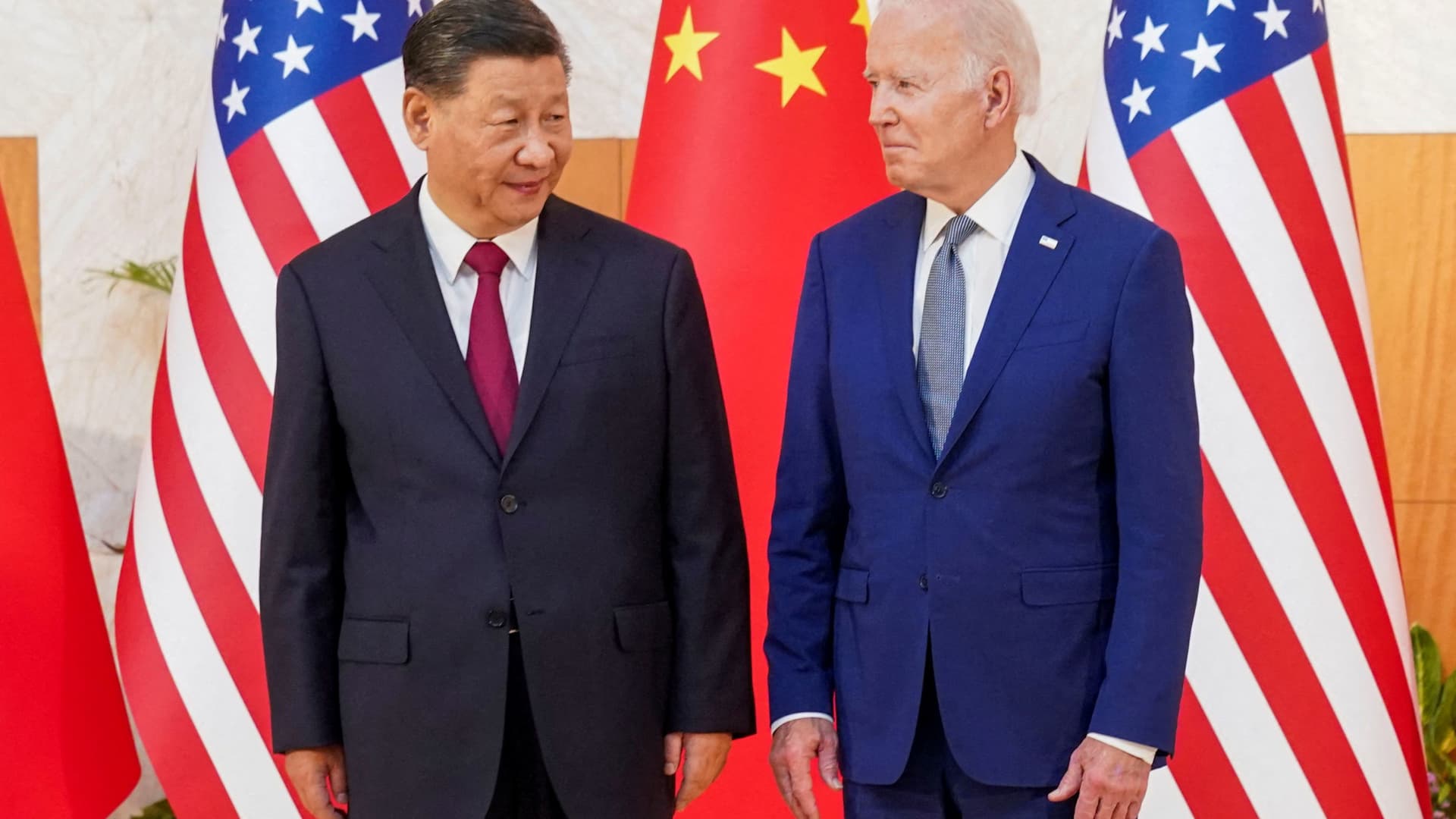U.S. President Joe Biden meets Chinese President Xi Jinping on the sidelines of the G-20 Leaders’ Summit in Bali, Indonesia, November 14, 2022.
Kevin Lamarque | Reuters
The Biden administration announced tough new tariffs on $18 billion in Chinese imports on Tuesday. The White House said the tariff increases were necessary to protect American industry from unfair competition.
Starting this year, President Joe Biden will quadruple tariffs on imported Chinese electric vehicles, from 25% to 100%. The import tax on Chinese solar cells will double, from 25% to 50%. And tariffs on some Chinese steel and aluminum imports will more than triple, from 7.5% today to 25%.
The president also directed U.S. Trade Representative Katherine Tai to more than triple tariff rates on lithium-ion batteries for electric vehicles and lithium batteries for other purposes. Starting in 2025, tariffs on imported Chinese semiconductors will rise from 25% to 50%.
For the first time, tariffs will be imposed on Chinese imports of medical needles and syringes as well as giant ship-to-shore cranes, a White House briefing said. Chinese rubber medical gloves and some respirators and face masks will also be affected by higher tariffs.
Some items, such as batteries and natural graphite, have longer tariff introduction periods. The White House said this is partly aimed at giving the U.S. manufacturing sector time to grow enough to produce enough batteries domestically to meet consumer demand.
“China is producing at a rate and at a rate that far exceeds any plausible estimate of global demand,” a senior administration official said on a call with reporters on Monday.
“This will flood the global market with offers that will undermine our ability to build domestic manufacturing capacity and … make all of us around the world more vulnerable to economic coercion,” the official said.
Beijing quickly condemned the new tariffs on Tuesday.
“The U.S. escalation of Section 301 tariffs contradicts President Biden’s commitments not to suppress or contain China’s development and not to seek decoupling from China,” a Commerce Department spokesperson said in a statement. “The US should immediately correct its wrongdoing and lift tariff measures against China. China will take decisive action to defend its own interests.”
Warning signals
White House officials from various agencies have raised concerns in recent weeks about China’s domestic subsidies for clean energy production.
They believe Beijing’s subsidies help companies produce cheap, clean energy products such as solar panels and electric vehicles that exceed domestic demand.
If companies can’t sell those surpluses domestically, U.S. officials warned, they could end up dumping them on global markets, making it difficult for emerging clean energy industries in other countries to complete.
“China’s overcapacity is distorting global prices and production patterns, harming American companies and workers as well as companies and workers around the world,” Treasury Secretary Janet Yellen said in March before her visit to China, where she confronted government officials on the issue.
Xinhua, the Chinese government news agency, called Yellen’s claims “baseless” and “a reflection of the zero-sum mentality of some policymakers in Washington.”
Political missions
The new trade restrictions come during the White House’s official “infrastructure week,” as Cabinet officials tour the country touting Biden’s massive investments in infrastructure and clean energy.
However, many of these investments are still in the early stages of implementation. The tariffs announced Tuesday are designed to help prevent a rush of cheap Chinese goods from hampering America’s progress on clean energy.
U.S. Trade Representative Katherine Tai speaks to the media during the Indo-Pacific Economic Framework meeting May 27, 2023 in Detroit, Michigan.
Rebecca Cook | Reuters
“The Chinese have invested in their domestic electric vehicle industry [with] the range of unfair practices that give them significant market, price and competitive advantages,” an administration official said.
“It was important for us to ensure we had the right safeguards in place given the rapidly growing exports and overcapacity in this sector,” the official added.
There are probably other factors at play that go beyond mere protectionism. The future success of Biden’s public investments in green energy, semiconductors and traditional infrastructure is an important part of his case for re-election in November.
Both Biden and presumptive Republican nominee Donald Trump have opted for a tough foreign policy toward China. And everyone has a record in the Oval Office to prove it.
“No inflationary effects”
While increasing China tariffs helps Biden maintain his hawkish stance, analysts warn of unintended consequences that new import tariffs could have on the domestic economy and individual consumers.
Goldman Sachs, for example, previously estimated that every one percentage point increase in the effective tariff rate would reduce gross domestic product by 0.03%, increase consumer prices by 0.1% and stoke inflation for a year.
The Biden administration has so far maintained that these tariffs will have “no inflationary impact” because they do not have a “broad” impact on the economy and only target specific sectors, a senior administration official said on Monday’s call.
This contrasts with Trump’s campaign proposals, which call for an indiscriminate 10% tariff on all imports.
US President Donald Trump and Chinese President Xi Jinping at the G20 summit of heads of state and government in Japan on June 29, 2019.
Kevin Lamarque | Reuters
Consumers can expect “no cost increases” from Biden’s new tariffs, the senior official added on Monday.
“What Americans can expect is that ongoing investments that are creating record levels of manufacturing and factory construction jobs will continue,” the official said. “These tariffs will protect and secure those profits.”
Source link
2024-05-14 12:59:47
www.cnbc.com







